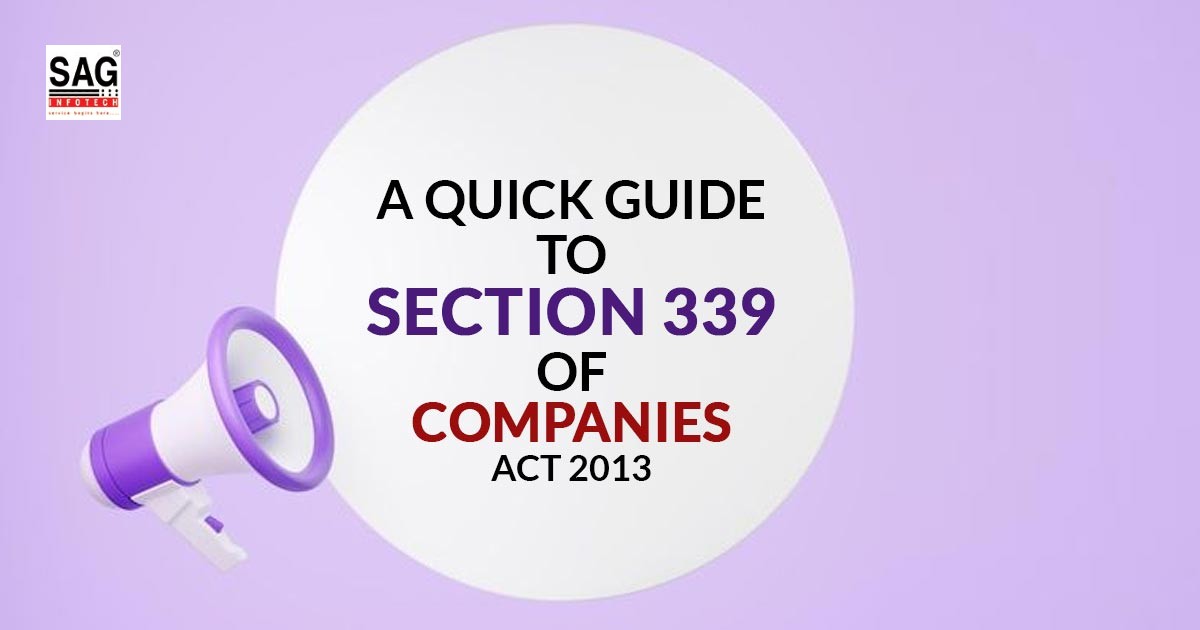
Section 339 of the Companies Act 2013 is a critical law that deals with unfair business practices in India.
Simple to Understand Section 339 of the Companies Act
Section 339 of the Companies Act 2013 (hereinafter referred to as “the Act”) is a significant clause that addresses India’s unscrupulous business practices. Any shareholder, officer, or employee of a firm who engages in fraudulent activity that is detrimental to the interests of the company is subject to this clause. By placing liability on the dishonest individuals who are in charge of such actions, Section 339 aims to defend the interests of investors and other stakeholders.
This article examines the relevance of Section 339 of the Act and the legal consequences of its violation. This article examines the scope and ramifications of Section 339 in relation to fraudulent business behaviour using a detailed review of case law and literature.
Important: Section 338 of Companies Act: Purpose, Analysis & Penalty
Most Important Features of Section 339 Under the Companies Act 2013
Section 339 of the Act addresses fraud offences and other relevant issues. To expand further, Section 339 makes fraud offences punishable by a fine, jail, or both. Section 339 discusses the following offences in detail:
- Business Fraud: According to Section 339, anybody who intentionally conducts the company’s business with the goal to mislead someone is guilty of fraudulent business conduct.
- Obtaining Wrongful Gain: According to Section 339 of the Act, anybody who obtains any property or advantage or persuades another person to provide any property or benefit to another with the aim to cheat or deceive is subject to punishment.
- Property Misappropriation and Misuse: Someone who uses or appropriates another person’s or the company’s property improperly with the aim to deceive someone else commits the crime of fraudulent conduct.
- Inactivity of a Company: The provisions of Section 339 of the Act must be followed when a corporation stops operating with the aim to deceive someone.
- Misrepresentation of Company Affairs: Any individual who intentionally misrepresents a substantial fact to deceive another person and persuades that person to act against his or her best interests is guilty of fraudulent behaviour.
Penalties Charges Under Section 339
According to Section 339 of the Act, anybody found guilty of engaging in fraudulent behaviour is liable under section 447 of the Companies Act, 2013.
As per section 447 of the Companies Act, 2013, where any person is found guilty of fraud involving:
- An amount which is less than Rs. 10 Lakh or 1% of the turnover of the company, whichever is lower, and does not involve public interest, then the person will be subject to imprisonment for a maximum of 5 years or a fine which may extend to Rs. 50 Lakhs or both.
- An amount of more than Rs. 10 Lakh or 1% of the turnover of the company, whichever is lower, then the person will be subject to imprisonment for a minimum 6 months and a maximum of 10 years along with a fine which shall not be less than the amount involved in the fraud, but which may extend to three times the amount involved in the fraud.
Further, if the fraud is subject to public interest then the imprisonment term shall bea minimum of 3 years.
Read Also: All About Registration of Section 8 Company with Procedure
Case Law Review of Section 339 Under the Companies Act
In the case of Datamail Systems Limited vs. Kotak Electric Ltd. & Ors., the Apex Court addressed a violation of Section 339 of the Act. The Court determined that in order to persuade people to invest money in the company, a misrepresentation of the facts related to its financial status was made, and as a result, the person who made the misrepresentation was subject to punishment.
The court decided in the case of Jai Bharat Maruti Ltd. vs. Keshav Raj & Ors. that anybody who engages in any unethical conduct to the harm of the firm can be declared guilty of the charge and thus be subject to punishment.
In the case of State Bank of India vs. Deepak Rajan & Ors., the court considered the provisions of Section 339 of the Act and found that a person was subject to punishment under Section 339 if they intentionally misappropriated bank funds for their own benefit while causing harm to others.
The aforementioned decisions make it clear that anybody who engages in dishonest business practices in order to benefit unlawfully for himself is equally subject to being penalized under Section 339 of the Act.
Closure: To sum up, Section 339 of the Companies Act 2013 is a suitable regulation that protects fair play in the business sector. Any individual discovered engaging in dishonest behaviour that harms the firm or serves their personal unfair gain is subject to punishment with jail and/or a fine. Hence, it is essential that businesses take precautions to stop engaging in any form of fraud in order to avoid fines or other punishments.
As a result, by adopting preventative steps and monitoring its operations, the firm will not only avoid any legal issues but will also make sure that the interests of all of its stakeholders are protected.










Dear sir
Interesting article.I request you to share the court orders/Judgements in the case laws cited by you viz., Datamail Systems Limited vs. Kotak Electric Ltd. & Ors, Jai Bharat Maruti Ltd. vs. Keshav Raj & Ors. and State Bank of India vs. Deepak Rajan & Ors..